Brexit = Party Interest – National Interest (or 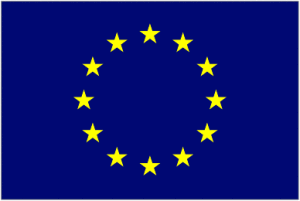 the EU and UK Politics)
the EU and UK Politics)
We have a Referendum on our membership of the European Union (EU) on 23rd June 2016. Solemnly we are told this will be the most important decision of our lifetimes. The Media often colludes with the political establishment to elevate hyperbole to an exaggerated art form.
Mr Cameron announced the referendum yesterday – having first – with with a magician’s flourish – pulled many marvels from the fantastical hat of his Renegotiation. Oddly having pulled the dazed rabbits and shaken them before our disbelieving eyes he dropped them unceremoniously into thin air where alike the smile of the Cheshire cat they disappeared from view. It was quite a trick. Then, without pause, he started talking about security and terrorism and war and how we’d all be better off staying together in an uncertain world. I was no longer sure whether he was defending the UN, NATO or the EU or everybody in general as they all seemed to merge seamlessly into one Big Society. He then frothed about how the UK was not going to be part of a EU Defence Policy or EU army and foamed about how the UK would never be party to the Schengen Agreement (the open borders arrangement between EU states) and finally stamping his rhetorical foot and saying the UK would never, never, ever join the Euro – as if any or all of these things had been any part of his negotiations with his EU – which of course they hadn’t.
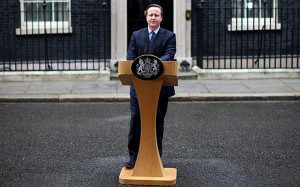 Then the people’s Dave, with all the chupatza of Hughie Green in is pomp, looked square into the lens of camera and spoke from the heart – most sincerely – straight to the British people – assuring them – rather like a dotty maiden aunt over the Christmas dinner – that he hates Brussels but loves Britain. Then with a faint tremor for sincerity’s sake he then said though he loved Britain as PM he had a duty to tell us he knew it was in the nation’s interest that we all vote to stay in Europe. Finally, almost choking on the emotion of the moment he said it was up to the British people – they had the final say – they had the vote and no matter how the voted – he would announce the winner and take the prize. With that he turned and strode purposefully back into 10 Downing St.
Then the people’s Dave, with all the chupatza of Hughie Green in is pomp, looked square into the lens of camera and spoke from the heart – most sincerely – straight to the British people – assuring them – rather like a dotty maiden aunt over the Christmas dinner – that he hates Brussels but loves Britain. Then with a faint tremor for sincerity’s sake he then said though he loved Britain as PM he had a duty to tell us he knew it was in the nation’s interest that we all vote to stay in Europe. Finally, almost choking on the emotion of the moment he said it was up to the British people – they had the final say – they had the vote and no matter how the voted – he would announce the winner and take the prize. With that he turned and strode purposefully back into 10 Downing St.
The only thing that seemed to be missing from this performance were the phone numbers to call for Yes or No – now not even Brucie in his rambling dotage on Strictly would have forgotten them…
I, alas, do not form part of the great audience to whom his comments were addressed – the great British people. Therefore I must admit I paid little heed to much else Mr Cameron said. I am of course a voter and I will cast my ballot in this plebiscite – but as I am by birth Irish – and although I have lived here in the UK since 1957 – as I’m still an Irish citizen I was not part of the body politic to whom Dave was talking. Ergo, as dear Dave was not addressing himself to me I felt I could safely ignore not only what has been said but also all the rest of what’s to be said – back and forth – over the next gruelling 4 months. By the time we stagger over the line and start to vote the poor British people will have to be assailed from dusk to dawn and back on all sides by some very, very, very boring arguments.
It is in fact the second time in my lifetime that I have had a vote in a referendum on the subject of EU membership. I am of that aged minority who voted in the last referendum in June 1975 – when the then Prime Minister – (James) Harold Wilson – after a very similar renegotiation of the terms of our membership – suggested very alike the current PM that all things considered – and with all the safeguards now safely in place – that it was on balance in the long term interests of the UK to remain in Europe. The margin of YES victory was substantial – 67% to 33% although the margin in Scotland was 8% narrower and Shetland and the Western Isles actually voted to leave.
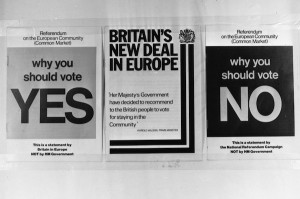
1st May 1975: Three documents, for and against, published for the referendum on the Common Market. The document ‘Britain’s New Deal in Europe’ (centre) contains a recommendation by the government signed by prime minister Harold Wilson for Britain to stay in the Community. (Photo by Keystone/Getty Images)
Foolishly, a great admirer of the political skills of Harold Wilson, I thought the question was settled then once and for all. But the European geni has a most destructive way of popping out of the bottle. Since that referendum of June 1975 one or other of the two main political parties in the UK has at one time or other proposed more or less that the UK leave the EU. In the case of the Labour Party it was during its last dervish dance with “true socialism” when it discovered that the widespread nationalisations and contra-cyclical public spending it proposed to eliminate unemployment would not be possibly in the straightjacket of EEC regulations. It proposed to exit the EEC in its famously losing election manifesto in 1983.
After electoral disaster the party turned to Neil Kinnock – a unilateralist and also a staunch anti-EEC figure who was prominent on what them was called the soft left of the party and Michael Foot’s chosen heir. Kinnock tempered the worst of the ‘socialist’ excesses of the party and hoped for the best but discovered too late that not even the best ‘socialism’ was good enough for voters intoxicated with the magic of markets; the privatisations with their cheap share quick profit bonanzas and the casino capitalism of the banks.
The Labour Party fell in love with the European Union late – towards the end of the 1980’s – when the EU of Francois Mitterrand and Jacques Delors had embraced an agenda of employee rights, union rights and worker benefits as part of the ever deepening union and partly as the consequence of the decision to create a single market within the EU – an economic end championed by none other than Mrs Thatcher. The UK unions realised that whilst their political goose was being well and truly basted in the UK, in the EU, unions, instead of getting truly stuffed, were in fact thriving and garnering greater rights
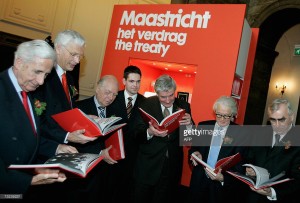 The Social Chapter of the Maastricht Treaty turned this promise into a governing reality and the Conservative Major government took fright and carefully negotiated a derogation for the UK from the Social Chapter of the treaty which with amongst other things included the infamous Working Time Directive. That derogation was not enough for the right wing of the Conservative Parliamentary Party – who rightly saw that what Major had negotiated did not in any way bind successor governments from embracing the notion of ever closer union which was at the heart of the Maastricht process and which was given fullest expression in the project for the Single Currency. However, whilst the ERM debacle destroyed the political viability of the UK joining the Single Currency it was this ‘social’ Europe and its juridical consequences that became the bete noir of the Conservative mainstream and increasingly of its rather more right wing and elderly grassroot membership.
The Social Chapter of the Maastricht Treaty turned this promise into a governing reality and the Conservative Major government took fright and carefully negotiated a derogation for the UK from the Social Chapter of the treaty which with amongst other things included the infamous Working Time Directive. That derogation was not enough for the right wing of the Conservative Parliamentary Party – who rightly saw that what Major had negotiated did not in any way bind successor governments from embracing the notion of ever closer union which was at the heart of the Maastricht process and which was given fullest expression in the project for the Single Currency. However, whilst the ERM debacle destroyed the political viability of the UK joining the Single Currency it was this ‘social’ Europe and its juridical consequences that became the bete noir of the Conservative mainstream and increasingly of its rather more right wing and elderly grassroot membership.
After its stunning electoral defeat in 1997 the Conservative party aped Labour and went off to play by itself under the fateful leadership of William Hague. It is the nature of the Conservative Party to be pretty closed minded about most things it chooses to think about – that to some extent is the necessary corollary of being conservative in the first place – but it is also a party created for and wedded to power and all principles are therefore mutable – so as a party it can easily change its mind for reasons of electoral expedience – this is after all the Party which gave us Butskellism in the 1950’s; incomes policies in the 1960’s and early 1970’s; and both Clause 28 and Gay Marriage in the space of twenty years. However, on the subject of Europe in general an the EU in particular – it’s mind had been made-up – closed as a clam – ever since the defenestration of Margaret Thatcher of blessed memory from Downing St in 1990. If anything since then the Tory grassroots has tended to become more hostile to the EU – although its pragmatic leadership has long sought to temper – by guile or by delay – the worst excesses of the party members.
Enter – stage right – very staged right – the incredible Houdini – David Cameron. Mr Cameron sought to get his party off the hook of Europe by offering the right an in/out Referendum. Mr Cameron (and his amanuensis Mr Osborn) were children of Thatcher but were also mesmerised by Tony Blair. For much of his leadership Cameron has made much of taking leaves from the Tony Blair book of politics and government. Blair however, like Thatcher, was a conviction politician and, like her, whilst his convictions held he was pure gold for his party but when their gilt rubbed off – in Thatcher’s case over the Poll Tax and in Blair’s case over Iraq – their glister was quickly lost.
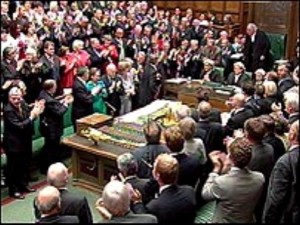 David Cameron, however, has never really been heir to Blair. His convictions are few and his beliefs correspondingly shallow – he is a marketing genius but without any serious political convictions or true principles. Publically, for example, he calls himself a believing Anglican Christian – but airily dispenses with the necessary props of his Christian belief – Church attendance and prayer. As with his religious affiliations so with his political beliefs. Mr Cameron said all manner of things about how the Big Society would look after the poor – compassionate conservatism – all things he promised would be bright and beautiful – speaking as a decent, caring, family man who could be trusted – but once he had shaken hands he went off down the drive – back to the hunt ball – without so much as looking back over his shoulder to the poor man as yet still left at his gate. It is this that provides the true context of the renegotiations that have just taken place.
David Cameron, however, has never really been heir to Blair. His convictions are few and his beliefs correspondingly shallow – he is a marketing genius but without any serious political convictions or true principles. Publically, for example, he calls himself a believing Anglican Christian – but airily dispenses with the necessary props of his Christian belief – Church attendance and prayer. As with his religious affiliations so with his political beliefs. Mr Cameron said all manner of things about how the Big Society would look after the poor – compassionate conservatism – all things he promised would be bright and beautiful – speaking as a decent, caring, family man who could be trusted – but once he had shaken hands he went off down the drive – back to the hunt ball – without so much as looking back over his shoulder to the poor man as yet still left at his gate. It is this that provides the true context of the renegotiations that have just taken place.
Since his accession to power in 2010 if anything Mr Cameron has shown himself to be even more calculating as an office holder than ever he first appeared to be as the ever greener than thou bicycling green that was the huskie-hugging, hoodie-loving Leader of the Opposition. His shallow fluency owns the mercurial flash of the very clever very apt first Class PPE student he was at Oxford. Quicksilver theatricality is the oil that runs Mr Cameron’s political machinery. He drives this engine smoothly along tracks of inclusive rhetoric with aplomb and to a general applause that belies the fact that his train is for first class ticket holders only. Schooled in privilege – he is Walpole rather than a Disraeli – a man for whom party interest is the national interest because he has never seen any practical distinction between them. He combines the vanities of the shallow cynic with the word-weary rhetoric of the thoughtful statesman. He means not one word of what he has to say.
Yesterday, all of these gifts for plausibility were once more on display in Downing Street. Cameron, however, now has to negotiate the Media wolves he has long fed on juicy half promises. The skills Mr Cameron owns – and they are very considerable – do not make for greatness but they do make for longevity in office. It could be however, no matter what the outcome of this referendum that they have carried him just about as far as he can go. Those in his own party are ceasing to trust him. Interestingly Tim Montgomerie has just resigned from the Conservative Party. Boris Johnson – that bell-weather of political ambition – has decided to campaign for Brexit. The reason is simple enough – his competitors for the leadership have lined up behind Mr Cameron but Boris knows the Conservative Parliamentary Party will not decide who the next Conservative Leader will be – it will be the deeply anti European grassroots members – the same lot that elected Ian Duncan Smith in 2001. Johnson is now perfectly positioned to win – and if there is Brexit Mr Cameron will most likely have to go – and if the answer is Yes – as it was in 1975 – then Dave will probably alike his true political mentor – Harold Wilson – bow out gracefully before he gets chucked out bloodily.
There are many good arguments for staying in the EU. There are other arguments for leaving it. A balanced analysis of the cons and pros of membership of the EU, however, would only do a disservice to the politics of Europe in the recent history of the UK. Unlike any other member of the EU by the end of June 2016 we will have had two referenda in 40 years on the principle of membership.On both occasions the plebiscite has been conceded not from lofty constitutional need; nor from the highest political principle; but rather by the dictates lowest party cunning. I say this not to disparage political parties for they have long been the means of making respectable the marriage of the base motives of sectional interest to the governing interests of the state. It is not new. However, since the motives for this Referendum are nakedly political it is a cruel fact that it will not settle the matter once and for all – any more than the referendum of 1975 settled business. Therefore, as before, the political establishment – less the newspaper Media – will bank upon the voters voting yes – not out of conviction but out of fear of making their unsettled and uncertain lives less certain and less settled. Of course they may vote no; but those of you who know anything about the history of the EU – will know that no may in time pupate into yes if only you keep asking cajolingly enough….
 I haven’t changed my mind about the EU since I voted Yes in 1975. I can see no sensible argument against pooling sovereignty in order to gain prosperity – it has been the history of the world since the time of the Chin and the Pharaoh. The institutions of the EU will evolve and probably those of the central core of Euro states will piecemeal arrive at more democratic structures over time. The nation states and their political elites will struggle against the inevitable but over another fifty or seventy five years things will have changed out of recognition as they indeed have already changed beyond what was imagined by the original Coal and Steel Union. Gradually as the power of the US wanes the UK will seek out it full political place in this European Union. That will be all to the good but in the interim we will just have to endure the knee-jerk referenda that will come our way from time to time to please one or other of our governing parties.
I haven’t changed my mind about the EU since I voted Yes in 1975. I can see no sensible argument against pooling sovereignty in order to gain prosperity – it has been the history of the world since the time of the Chin and the Pharaoh. The institutions of the EU will evolve and probably those of the central core of Euro states will piecemeal arrive at more democratic structures over time. The nation states and their political elites will struggle against the inevitable but over another fifty or seventy five years things will have changed out of recognition as they indeed have already changed beyond what was imagined by the original Coal and Steel Union. Gradually as the power of the US wanes the UK will seek out it full political place in this European Union. That will be all to the good but in the interim we will just have to endure the knee-jerk referenda that will come our way from time to time to please one or other of our governing parties.
However, as I am being asked to trot off to the polling station once again to register my opinion on the matter I thought I should be forthright. The truth is no one is really that interested in my opinion – and that is most particularly true of Mr Cameron and the political bark that bears the oleaginous bulk that is the Conservative Party. My vote is however as settled now as it was before. I am not persuadable and do not need to ponder this in my heart over many hours for four months.
It is said we get the governments we deserve – which must imply that we’ve all been very, very, very naughty….
